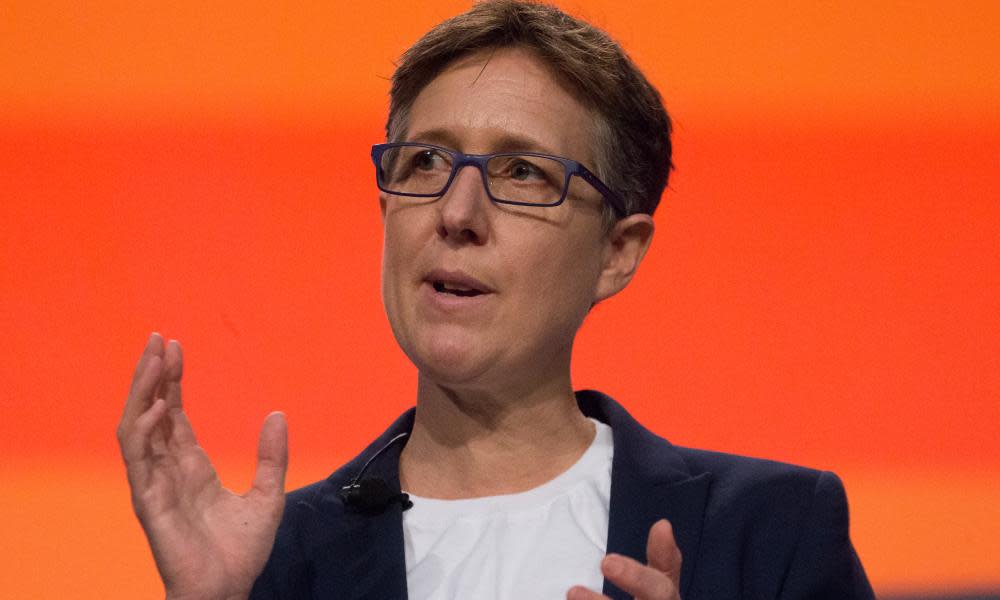Facebook won't take down fake posts about Sally McManus and Bill Shorten

Facebook has rebuffed an appeal by the ACTU to take down fake tweets purporting to be from Sally McManus and Bill Shorten, arguing the content doesn’t violate the social media giant’s community guidelines.
Screenshots of the fake tweets, one from McManus saying the Labor conference had endorsed an inheritance tax, and another from Shorten saying “immigration of people from the Middle East is the future Australia needs”, are posted on the Facebook pages Respect Australia Rally – National and I’ll Stand by Tony Abbott.
The fake McManus tweet declaring Labor’s support for an inheritance tax first appeared on 21 April, and the ACTU secretary disavowed it immediately.
Related: Facebook urges Australians to report fake ads as it launches tool to target scammers
The Respect Australia Rally – National Facebook page posted a screenshot of the tweet later in April. The post acknowledges there is debate about whether the tweet is authentic, but says it doesn’t matter. “Just because Labor says it’s a fake doesn’t make it a fake, so share it far and wide,” the post says.
According to correspondence seen by Guardian Australia, the ACTU told Facebook this represented the “deliberate dissemination of false news”, but a response from a client support analyst said while “we understand that the content was upsetting and we’re sorry you had to experience this” the content “doesn’t violate our community guidelines”.
Facebook revealed in October it removed two instances of “coordinated inauthentic behaviour” on its platform during the May federal election. But the company has said repeatedly it does not want to be the arbiter of truth, or to “referee political debates”.
It told the joint standing committee on electoral matters in a submission: “Facebook does not believe that it’s an appropriate role for us to be the arbiter of truth over content shared by ordinary Australians or to referee political debates and prevent a politician’s speech from reaching its audience and being subject to public debate and scrutiny.”
Guardian Australia revealed in June as part of a post-election investigation into the death tax misinformation that the Labor campaign pressed Facebook repeatedly to deal with the false claims shared on the platform during the federal election, and escalated their complaints in the final week.
But the social media giant declined to play censor. Simon Milner, the Singapore-based vice-president of the social media giant in the Asia-Pacific, told Labor after the election in correspondence seen by Guardian Australia: “We do not agree that it is our role to remove content that one side of a political debate considers to be false.”
Facebook’s independent fact checking procedures found the death tax content circulating on the platform was false, not arguably false. The platform says it responded to the misinformation by demoting the offending content in the news feed.
McManus says Facebook needs to accept civic responsibility, given its reach. “Social media now plays a critical role in our democracy because a large percentage of the population now get their news directly from their Facebook News Feeds.
Related: Facebook removed 'coordinated inauthentic behaviour' during Australian election
“Facebook is a giant corporation that will undermine democracy in Australia and elsewhere unless it takes the issue of deliberate disinformation and impersonation seriously,” McManus said. “This would mean prioritising this issue over their significant profits.”
Her language echoes that of the competition regulator Rod Sims. The ACCC chairman said in August Facebook had the capability to deal with the proliferation of fake news, but was instead “palming off responsibility” to protect its bottom line.
The competition commission has the digital platforms in it sights, but the industry body representing Google, Facebook and Twitter has already rejected the ACCC’s proposal for an industry code of conduct to fight fake news, warning that the recommendation would turn Australia’s media regulator into the truth police.
Labor has urged the joint standing committee on electoral matters to investigate, as part of the post-election inquiry, whether the digital behemoths are having a negative impact on Australian democracy.
“The ALP encourages JSCEM to conduct a thorough examination of the impact that digital platforms are having on our democracy, and to pay particular regard to the proposition that Australian elections are vulnerable to influence by malinformation – defined by the ACCC as information deliberately spread by bad faith actors to inflict harm on a person, social group, organisation or country, particularly where this interferes with democratic processes,” the ALP submission says.

 Yahoo News
Yahoo News 
